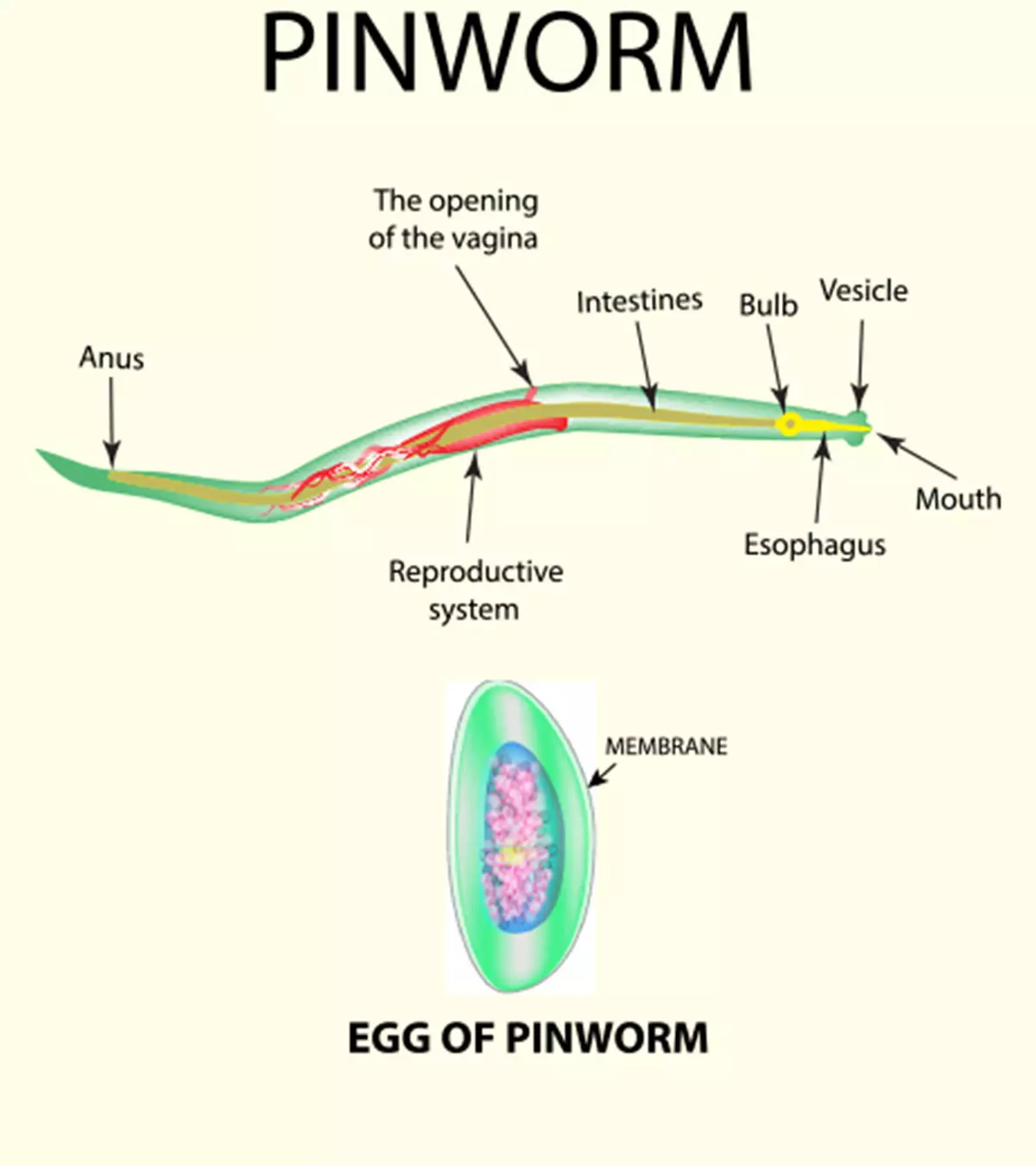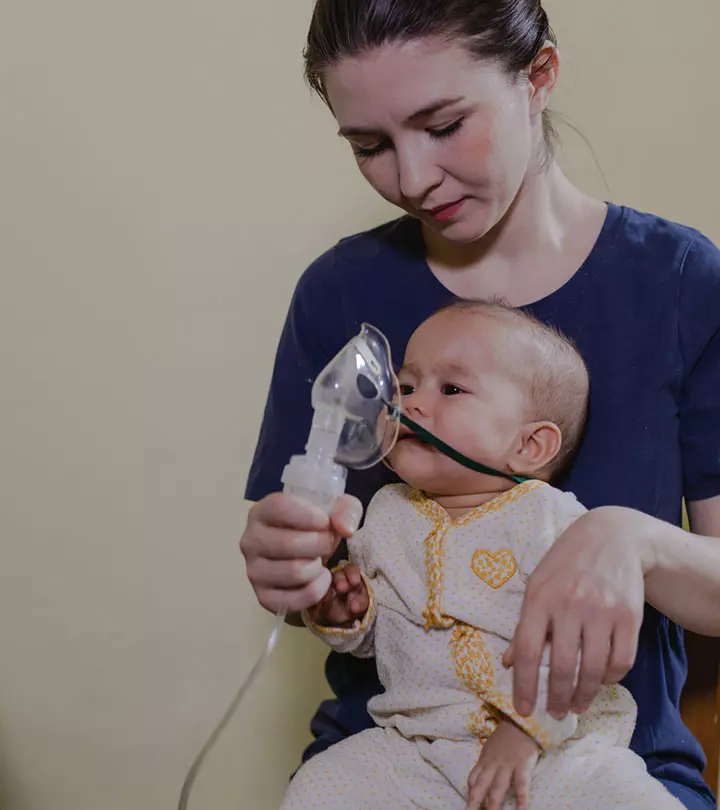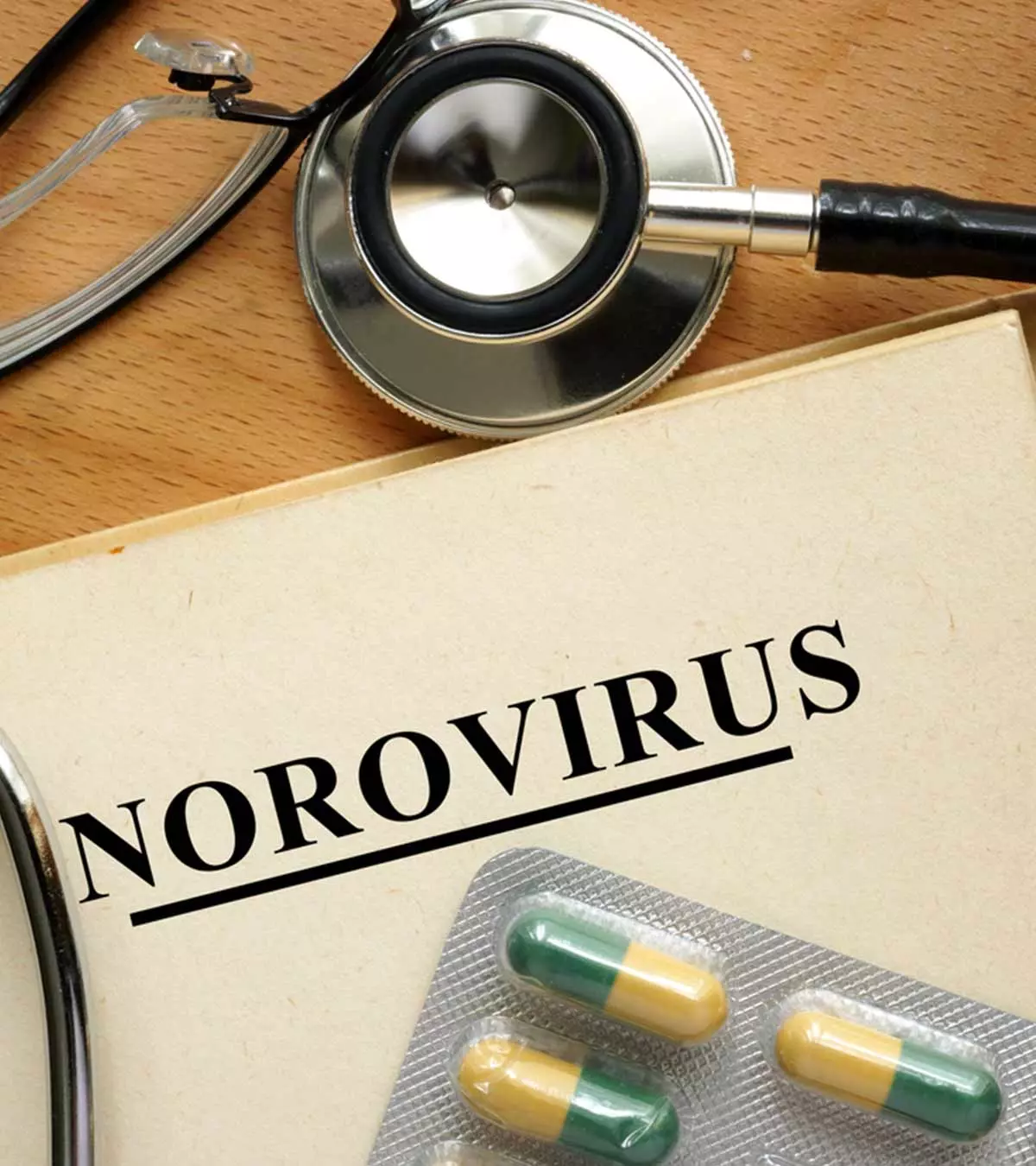
Image: Shutterstock

Tapeworms are intestinal parasites that cause infections in the intestines. A tapeworm infection during pregnancy poses significant health risks and complications for both mother and baby and can impact overall maternal health and fetal development. If you experience symptoms such as excessive vomiting, diarrhea, weight loss, and vitamin B12 deficiency, you could have a tapeworm infection. Hence, seek medical attention and get screened to confirm the diagnosis. The treatment for tapeworm infection is based on the type of tapeworm that has infected the body.
Keep reading this post to learn more about tapeworm infection, including its causes, symptoms, diagnosis, and treatment in pregnant women.
Key Pointers
- Tapeworm infection during pregnancy can have adverse effects if left untreated.
- Raw or undercooked meat and fish and poor hygiene are the primary causes of this disease.
- Symptoms of tapeworm infection include nausea, anemia, fever, diarrhea, stomach pain, and loss of appetite.
- Confirmation of tapeworm infection involves stool samples, blood tests, and ultrasounds.
- Anti-parasitic drugs are commonly used to treat tapeworm infection during pregnancy.
What Is Tapeworm Infection?
Tapeworms are parasites that thrive in your gastrointestinal tract. A tapeworm infection affects your digestive system and leads to diarrhea, nausea, vomiting, anemia, and weight loss. According to a study conducted by the World Health Organization, more than 1.5 billion people, or 24% of the world’s population, are infected with soil-transmitted helminths every year. Women with anemia may deliver babies with a low birth weight due to the presence of parasites. As an expectant mom, a tapeworm infection may be more dangerous for you than others, so visit a doctor immediately if you suffer from the symptoms of a tapeworm infection (1).
Causes Of Tapeworm Infection During Pregnancy
A tapeworm infection occurs due to the five types of worms we list below. These worms commonly affect humans and are cosmopolitan in distribution.
- Diphyllobothrium, or the fish tapeworm, occurs when you consume undercooked freshwater fish.
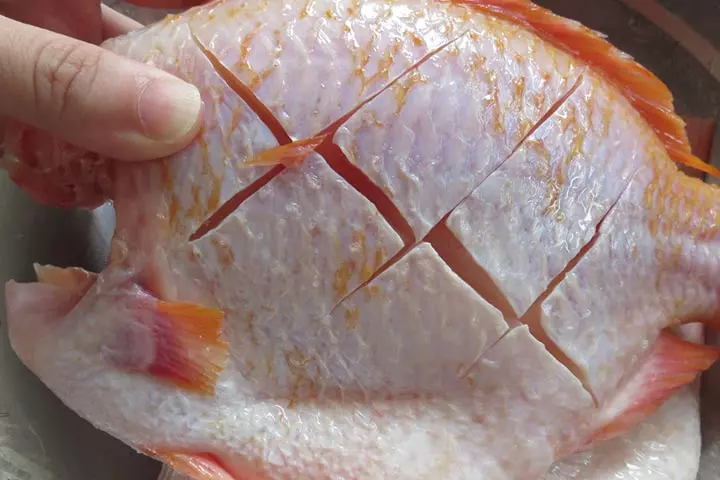
- Taenia solium, or the pork tapeworm, occurs when you consume undercooked pork
- Taenia saginata, or the beef tapeworm, occurs when you consume undercooked beef that comprises larval cysts.
- Hymenolepic, also popular as the dwarf tapeworm, is a unique species of tapeworm that spreads from human to human.
- Echinococcus comprises three species of tapeworm. Once you consume it, its larva moves throughout your body and leads to cysts in your organs.
- Poor hygiene practices too can cause tapeworm infection during pregnancy (2).
- Intestinal hookworm disease is caused by Ancylostoma duodenale, which is commonly called the Old World hookworm.
- Ascaris lumbricoides are parasitic worms that account for intestinal infections.
Symptoms Of Tapeworm During Pregnancy
The symptoms of a tapeworm infection are easily discernible. Some of the common symptoms may include:
- Abdominal pain. The area just above the stomach may hurt a lot.
- Nausea
- Vomiting
- Diarrhea
- Presence of larvae or segments of the tapeworm in the stools
- General weakness

 Quick fact
Quick factDiagnosing Tapeworm Infection During Pregnancy
Diagnosing a tapeworm infection involves different tests depending on the type of tapeworm infection. Here are some common diagnostic tests to detect tapeworm infection during pregnancy.
1. Blood tests
Prenatal testing of blood aims to look for the presence of antibodiesiProteins produced by the immune system to protect your body from foreign substances to tapeworm infection.
2. Imaging scans
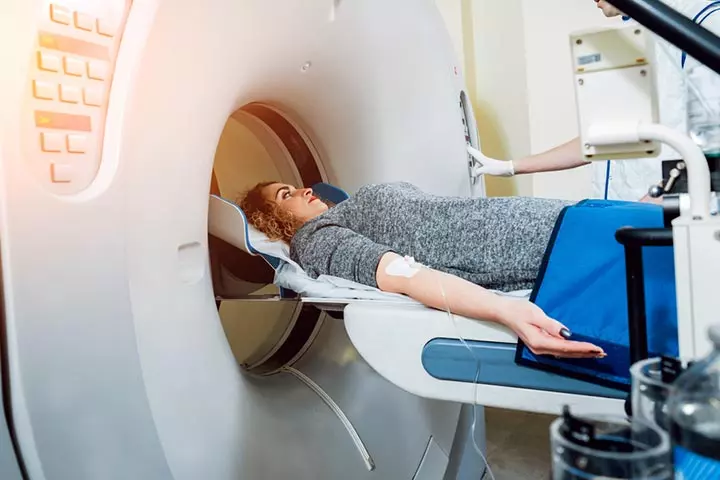
Imaging scans include an ultrasound scan, magnetic resonance imaging (MRI)iA medical imaging method that generates 3D images of the body's tissues using radio waves, magnetic field, and a computer , and computerized tomography (CT scan)iA kind of imaging test used to view detailed images of bones, tissues, organs, and blood vessels . If nothing prominent is seen in the blood tests, the doctor recommends imaging scans. Depending on the condition of the expecting mother, the doctor may recommend imaging scans.
3. Organ tests
The doctor may recommend organ tests to check the functioning of the affected organs.
Early diagnosis of a tapeworm infection is crucial for effective treatment and to minimize risks to maternal and fetal health. Delaying diagnosis may lead to complications such as anemia or malnutrition and adversely affect fetal development. Therefore, pregnant women experiencing symptoms should seek medical attention promptly.
Preventive Measures For Tapeworm Infection During Pregnancy
To reduce the risk of tapeworm infection during pregnancy, adhere to the following preventive measures.
- Ensure all meat and fish are thoroughly cooked before consumption.
- Practice good hygiene by washing hands regularly, especially after handling raw food or using the restroom.
- Avoid consuming food from unregulated sources or street vendors.
- Regularly deworm pets and maintain their hygiene.
Treating Tapeworm Infection During Pregnancy

It is best to consult the doctor as soon as symptoms of a tapeworm infection surface during your prenatal care. Depending on the type of tapeworm, the doctor will prescribe medicines. The treatment protocol depends on the type of worm infestation.
- For fish tapeworms, the doctor prescribes praziquantel and supplements of vitamin B that include folic acid.
- For pork tapeworm, the doctor recommends niclosamide or praziquantel. If the tapeworm infection results in cysts in the brain, the doctor is most likely to prescribe praziquantel, corticosteroidsi A group of steroid hormones produced in the adrenal cortex that are used to reduce inflammation , and albendazole.
- For beef tapeworms, doctors mostly prescribe niclosamide or praziquantel.
- For dwarf tapeworm, a doctor prescribes praziquantel or niclosamide to alleviate the symptoms of the infection
- Finally, for Echinococcus tapeworms, the doctor would recommend albendazole, praziquantel, or even surgery if need be (4).
These medications paralyze the worm, and they finally pass out of the body during bowel movements. Cramps may be felt when they pass.
When undergoing treatment for a tapeworm infection, ensure you maintain a balanced diet rich in essential nutrients to support your health and that of the baby. Nutritional support can aid recovery and help mitigate the potential effects of the infection on fetal development.
 Quick fact
Quick factFrequently Asked Questions
1. When can a pregnant woman take a dewormer?
Pregnant women are usually recommended to take a dewormer after the first trimester (5).
2. Can deworming cause miscarriage?
The drugs, Praziquantel and Niclosamide, used to treat tapeworm during pregnancy, belong to FDA pregnancy category B, which means that animal reproduction studies have not shown any risk to the fetal development. Still, well-controlled studies in pregnant women are not adequate. Doctors prescribe them if the benefits of treatment outweigh its risks (6) (7).
3. Can a tapeworm infection affect fertility?
No studies specifically examined tapeworms’ effect on fertility in women. However, hookworm and intestinal nematode infections have been shown to negatively affect a woman’s fertility (8). It has been also seen that parasite build-up leads to an inability to conceive or an ectopic pregnancy.
4. Will a tapeworm infection get better by itself?
Some tapeworm infections may not need treatment. However, if a tapeworm infection is causing symptoms or is diagnosed, you would need antiparasitic medicines to eliminate tapeworms from your system (9).
5. Can I feel it if a tapeworm moves inside me?
No, you cannot feel tapeworm movements though sometimes they can be seen in your stools or around the anal region.
6. Do I need to take treatment to cure a tapeworm infection?
Yes, if you are diagnosed with a tapeworm infection, you must undergo treatment. Untreated tapeworm infection can cause adverse health issues such as intestinal blockage or inflammation (10).
7. Are tapeworms contagious?
Yes, tapeworms can be contagious. People who do not wash their hands after using the restroom or handling raw meats or feces of animals can pass on tapeworms to others (11).
8. Can having a tapeworm infection make you feel hungry?
Yes, tapeworm infection can affect the digestive system and cause several symptoms. While some individuals with a tapeworm infection may feel more hungry, others may experience appetite loss, nausea, fatigue, stomach cramps, and diarrhea during pregnancy (12).
9. What are the benefits of deworming during pregnancy?
Deworming during pregnancy can significantly reduce the risk of maternal and fetal complications, enhance nutrient absorption, and improve overall health outcomes for both mother and child. It is recommended to discuss deworming options with a healthcare provider, particularly if symptoms of infection are present.
A tapeworm infection during pregnancy is concerning but can also be treated. Fortunately, most symptoms of a tapeworm infection are easily noticeable. However, if you are doubtful that you have consumed improperly cooked meat or have been to unclean places, you may report your doctor to get tested for an infection. Early diagnosis could prevent most complications of fetal malformations and ensure that the fetus receives proper prenatal nutrition. Either way, maintain proper hygiene during pregnancy and note any uncommon changes in the body to your physician to be safe.
Infographic: Preventing Tapeworm Infection During Pregnancy
A tapeworm infection, especially during pregnancy, can be one of the most uncomfortable conditions and may interfere with a healthy pregnancy. So if you want to avoid complications, taking the necessary measures to prevent this infection is better. Explore the infographic below to learn how.
Some thing wrong with infographic shortcode. please verify shortcode syntax
Illustration: Tapeworm During Pregnancy - 6 Causes 20 Symptoms & 5 Treatments

Image: Dall·E/MomJunction Design Team
Learn how to cure tapeworm infections with this helpful video! Gain a deeper understanding and pick up some tips to help you get rid of a tapeworm infection.
References
- Fish Tapeworm Infection.
https://medlineplus.gov/ency/article/001375.htm - About Human Tapeworm.
https://www.cdc.gov/taeniasis/about/?CDC_AAref_Val=https://www.cdc.gov/parasites/taeniasis/ - Cysticercosis.
https://rarediseases.org/rare-diseases/cysticercosis/ - Clinical Treatment of Taeniasis.
https://www.cdc.gov/taeniasis/hcp/clinical-care/index.html - Deworming women during pregnancy has a positive effect on child survival and health.
https://www.who.int/news/item/29-04-2025-deworming-women-during-pregnancy-has-a-positive-effect-on-child-survival-and-health - Parasitic Worm Infection During Pregnancy.
https://americanpregnancy.org/healthy-pregnancy/is-it-safe/parasitic-worm-infection-during-pregnancy/ - FDA Pregnancy Categories.
https://chemm.hhs.gov/pregnancycategories.htm - Intestinal worms may help women get pregnant more often;
https://www.science.org/content/article/intestinal-worms-may-help-women-get-pregnant-more-often - Tapeworm infection;
https://www.mayoclinic.org/diseases-conditions/tapeworm/diagnosis-treatment/drc-20378178 - Tapeworm infection;
https://www.mayoclinic.org/diseases-conditions/tapeworm/symptoms-causes/syc-20378174 - Tapeworm;
https://kidshealth.org/en/parents/tapeworm.html - Tapeworm Infection;
https://my.clevelandclinic.org/health/diseases/23950-tapeworm-infection
Community Experiences
Join the conversation and become a part of our nurturing community! Share your stories, experiences, and insights to connect with fellow parents.
Read full bio of Dr. Prachi Benara
Read full bio of shreeja pillai
Read full bio of Rebecca Malachi
Read full bio of Dr. Joyani Das







